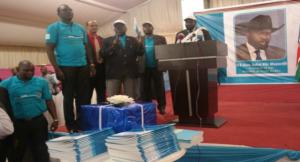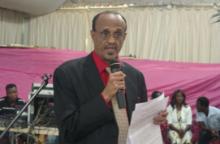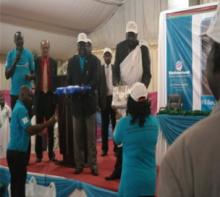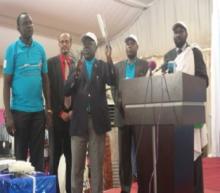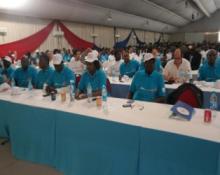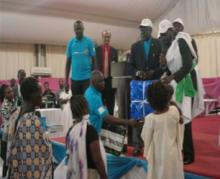South Sudan National Malaria Strategic Plan, 2014 – 2021, launched
The Ministry of Health with support of the World Health Organization has launched the first National Malaria Strategic Plan, 2014 to 2021, at a well organized ceremony at the Independence Hall in Juba, South Sudan.
The WHO Country Representative, Dr Abdi Aden Mohammed, who represented all UN agencies, pledged that health partners will continue supporting the MoH of South Sudan to reduce the burden of malaria. He said that malaria remains the leading cause of morbidity and mortality in the new nation, with the majority of the affected being children and pregnant mothers.
Since the signing of the Comprehensive Peace Agreement in 2005, in line with the global malaria control strategy, the Ministry of Health (MoH) has endeavoured to scale up malaria control efforts in the country. In March 2012, the Republic of South Sudan (RSS) undertook an in-depth Malaria Programme Review (MPR), to assess progress towards achievement of national, regional and global targets and to review the current programme performance by intervention thematic areas and by service delivery levels in order to redefine the strategic direction for improved programme performance.
WHO has worked with the Ministry of Health and partners to expand the implementation of malaria control and prevention activities across the country, including building the capacity of malaria control programme at the central and state levels. WHO is very committed to supporting and working very closely with the Ministry of Health to expand the prevention activities against Malaria as well as enhancing the accessibility and availability of malaria diagnosis and treatment at all levels. WHO provided technical and financial support to the Ministry during the process of developing the National Malaria Strategic Plan.
The Hon Dr Riek Gai Kok, Minister of health, stated that based on the geography and climate the territory of Southern Sudan it is suitable for malaria almost throughout with the only exception being a small area in the Southeast bordering Kenya according to the malaria risk mapping1. In the majority of the country malaria endemicity varies between meso-, hyper- and holo-endemic. Transmission is perennial with seasonal variations and the peak malaria incidence occurring towards the end of the rainy season.
He added that the major vectors are Anopheles gambiae s.s. and A. arabiensis and Anopheles funestus but very little is known about their relative distribution. Plasmodium falciparum is the dominant parasite except for the border regions with Ethiopia where Plasmodium vivax does frequently cause malaria episodes. As for the vector there are very limited data available on the exact epidemiology and distribution of parasite species. However, a recent malariometric survey which included two of the garrison towns indicated that parasite prevalence rate in children under 5 years was in the range of 30-40% in these urban centres.
Dr Riek noted that Malaria epidemics and more localized outbreaks do occur and are caused by environmental and climatic factors (e.g. massive flooding) but also by movement of populations with little immunity into areas of high transmission (Internally Displaced Persons) as well as lack of access to any kind of anti-malaria treatment in some areas. In the past indoor residual spraying and larviciding was used to prevent malaria transmission in and around the major towns and municipalities. However, due to the collapse of infrastructure and public services these interventions are currently not available. With the implementation of the new strategic plan, we shall overcome and lower both the morbidity and mortality of Malaria by 80% by the year 2020. He concluded by thanking all health partners in the health sector in South Sudan and in particular the indispensable role of WHO’s leadership in supporting MoH and SMoHs in improving the delivery of health services to the people of the Republic of South Sudan.
The launch was presided over by His Excellency the President of the Republic of South Sudan Gen Salva Kiir Mayardiit. In his speech, the president hailed health partners for supporting South Sudan to reduce the burden of malaria in the country. He thanked WHO for supporting South Sudan health services in partnership with MoH and other partners and in particular for the country to develop the National Malaria Strategic Plan that was being launched.
The development of the strategic plan was a multisectoral activity that had the participation of all partners with vested interest in malaria control in South Sudan. Prior to the launch, the World Health Organization (WHO) provided Technical Assistance to facilitate the consultative process towards an all inclusive National Malaria Strategic Plan.



